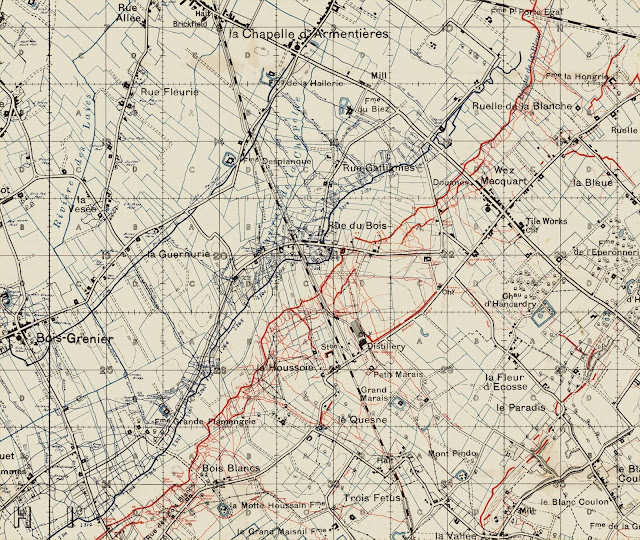With the weather described simply as ‘not good’, the
Battalion returned to the front line. The two attached companies of the Royal
Scots rendezvoused with the West Ridings at La Rolanderie at 10.45 am. Three of
the eight platoons were assigned to 'shadow' Tunstill’s Men; three more were to work
alongside ‘D’ Company and the other two with ‘B’. For the first two days the officers
and men were to be ‘paired’ on an individual basis at all ranks and then for
the remaining two days they were to be ‘paired’ on a platoon basis. At 5.15 pm
‘A’ Company led the Battalion on their move to the front line, with platoons
marching at intervals of 100 yards and, as they came closer to the front line,
from Gris Pot onwards to Bois Grenier, they proceeded by sections with the men
marching in single file on either side of the road. ‘C’ Company remained in
close reserve in the Bois Grenier Line while the others made their way to the
front line trenches. The Battalion was allocated a 1,000 yard front further south
than on their previous tour, with the right flank at Farm Grande Flamengrie at
the end of the main Shaftesbury Avenue communication trench. This was to be
where Tunstill’s Men were to be positioned, with ‘B’ Company to their immediate
left and ‘D’ further left still. This was familiar ground, which the companies
had occupied on previous tours (see 14th December). The reliefs were completed without incident
by 8 pm. With two extra companies in the line, conditions were more crowded
than usual and company commanders were reminded that, “special note should be
taken of all available dugouts”.
The story of the 16th Royal Scots has been
extensively researched and published in fascinating detail by Jack Alexander in
his excellent book, McCrae’s Battalion,
and extracts from his work help to add detail to the events of the following
days.
Sgt. Gerald Crawford of the Royal Scots wrote to his family
from his billet near Vieux Berquin just before moving up to the line: “for we
have arrived on a salient in the British sector and the noise of guns is now
continuous on all sides. Brother Boche occupies much of the ground to the north
and south, as well as to the east, so we are perfectly besieged”. Having
arrived in the line, Crawford was able to describe his new surroundings, and in
particular his approach to the front line down Shaftesbury Avenue: “The trench
is not wide but the boards are frequently loose so that if your pack makes you
top heavy, or your boots are slippery with mud, you run a fair chance of a dip
in the muddy depths below. Sometimes the enemy may know of your movements, but
if they do not they just keep up an intermittent fire on the off-chance of
catching someone. When you hear the crack of a rifle or the ping of a bullet,
you cannot help ducking your head instinctively at first, but in a few minutes
you get over it. When you finally emerge into the first line trenches you are
again in another world”.
Pte. William Andrew
Leiper Long was admitted via 69th Field Ambulance, 1st
Canadian Casualty Clearing Station and 22nd General Hospital in
Wimereux to 5th Convalescent Depot also in Wimereux; he was
suffering from influenza. He was a 20 year-old weaver from Keighley; he had
enlisted in January 1915 and had been posted to 10DWR in April.
2Lt. John Henry
Hitchin, who had been absent without leave from 11th Battalion
West Ridings for the last month (see 29th
December) checked himself in at the Waterloo Hotel, York Road, Lambeth. He
was wearing the uniform of a Lieutenant and told staff at the hotel that he had
recently been promoted Captain, which, of course, was quite untrue.
A payment of £7 0s 3d, being the amount due on his army pay,
was authorised to John Cardwell, father of Pte. John Cardwell who had been killed two months earlier (see 21st November 1915).

No comments:
Post a Comment